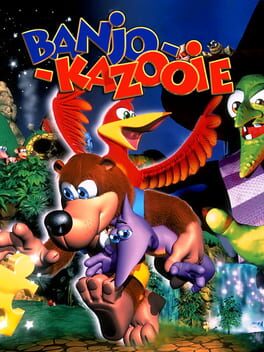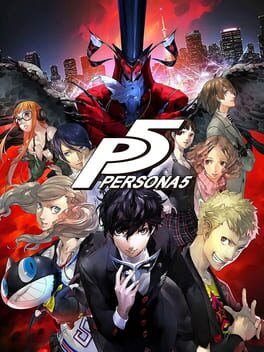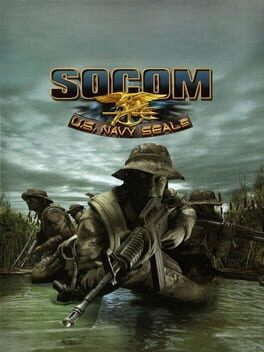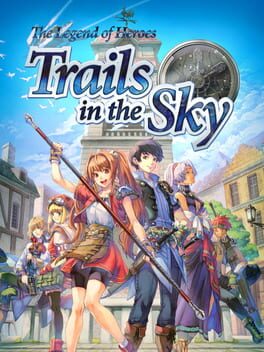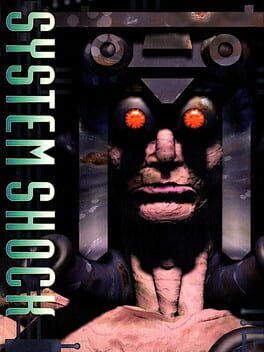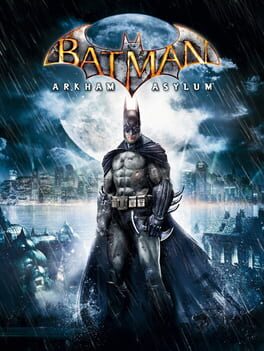Palipilino
Bio
games are fun
my reviews have a self-imposed 5,000 character limit
5★: Life-Changing Masterpiece
4.5★: Genre-Defining Classic
4★: Excellent
3.5★: Great
3★: Good
2.5★: Average
2★: Subpar
1.5★: Poor
1★: Terrible
0.5★: Literally Unplayable
games are fun
my reviews have a self-imposed 5,000 character limit
5★: Life-Changing Masterpiece
4.5★: Genre-Defining Classic
4★: Excellent
3.5★: Great
3★: Good
2.5★: Average
2★: Subpar
1.5★: Poor
1★: Terrible
0.5★: Literally Unplayable
Badges

1 Years of Service
Being part of the Backloggd community for 1 year

Pinged
Mentioned by another user

Loved
Gained 100+ total review likes

GOTY '23
Participated in the 2023 Game of the Year Event

N00b
Played 100+ games

Gone Gold
Received 5+ likes on a review while featured on the front page

Donor
Liked 50+ reviews / lists

Popular
Gained 15+ followers

Liked
Gained 10+ total review likes

Noticed
Gained 3+ followers
Favorite Games
118
Total Games Played
014
Played in 2024
004
Games Backloggd
Recently Played See More
Recently Reviewed See More
There isn't a monopoly on first and third person shooters in today's market, but people sure do talk like there is. The perception makes sense; Call of Duty and Battlefield are franchises that are often released annually, and together account for a huge chunk of year-over-year sales (and advertising) in the shooter genre. Of course, it wasn't always like this; Call of Duty released their first game in 2003, and Battlefield just one year earlier. Only in the later 2000s, when they trended towards modern conflicts, would they go on to reach mind-boggling levels of success they're usually known for today.) The late 90s and early 2000s, then, can be considered a sort of Wild Wild West of the shooter genre on consoles. On the PS2, one of the series that was trying to conquer these lands was SOCOM. Billed as a tactical, realistic military simulation, it was completely antithetical to a certain Xbox console exclusive; yet just like Halo, SOCOM was a considerable success in large part due to its online capabilities. Over 20 years later, the only accessible part of this game is, unfortunately, the single player.
SOCOM U.S. Navy SEALs, to use its full name, was based around tackling missions with teams of 4; in the single player, this was 1 player and 3 AI controlled characters. The gimmick here is a good one; through a series of on-screen or spoken directions (via the included headset), the player could command their allies to take different actions. Clearing a room, covering a point, conducting an ambush at specific times; there are actually a decent amount of options for your team, and with customizable loadouts and preset points on each map, you're allowed to draw up your own plan of action. This game strived to be, especially in 2002, the definition of combat realism, and you can see the evidence in some areas. But here's the problem that you already probably saw coming; the AI in this game is just terrible.
The gravity of the situation is this; even in 2002, with vastly inferior technology, many reviews of this game will mention the poorly implemented AI. This isn't the case of a beloved game which aged badly; these features were dead on arrival. And really, with that, goes the whole premise of interesting or satisfying gameplay. Your companions are often getting stuck on textures, failing to locate enemies in their direct field of vision, and just generally being incompetent. (It should also be mentioned that the voice recognition technology at play here is only a few years advanced from Hey You, Pikachu!, and it shows.) And for what it's worth, the enemies aren't really holding up their end of the bargain either. Throughout SOCOM's 12 missions, your enemies never really put up any threat, possessing Stormtrooper levels of accuracy, and on some levels it would take a large amount of effort for the player to find themselves in any danger. This is quickly realized, of course, and even if all the tools you had at your disposal to perform a stealthy operation worked optimally, there'd be no real reason to use them. Most levels can be completed with simple run and gun tactics; the entire philosophy of this game is ruined by its poor AI implementation.
That is, until you actually beat the game a couple of times. For some unknown reason, the only way to increase its difficulty (of which there are 8, by the way) is to fully complete the game on the previous one. So if you want to truly test your tactical skills on the game's hardest difficulty, you'll have to beat it 7 times first. This is a baffling decision for most games, but for one as previously unengaging and dull as SOCOM? This is a ~10 hour long game, so it's not even something that can be breezed through in one sitting either. Maybe it offers some engaging and thrilling action on one of the game's higher difficulties, but with that way they're unlocked, why would anyone even bother to find out? The characters are dull, the scenarios are lifeless, and the game's plot is just a loosely disconnected series of missions. To have to play it once is disappointing enough; that SOCOM's developers thought it warranted multiple playthroughs is just bizarre.
There's a reason why what little discussion you can find online about this game is about nostalgia for its multiplayer. It's certainly easy to see why a grounded shooter like this would have provided a welcome option to players who didn't favor more sci-fi or action movie combat. It's certainly possible there was a great amount of fun to be had online with SOCOM; there must have been, because there's no real reason to view it with any fondness. It certainly gets some credit for its unique approach and design, but a good idea without the capability to implement it just leads to a bad game all the same.
SOCOM U.S. Navy SEALs, to use its full name, was based around tackling missions with teams of 4; in the single player, this was 1 player and 3 AI controlled characters. The gimmick here is a good one; through a series of on-screen or spoken directions (via the included headset), the player could command their allies to take different actions. Clearing a room, covering a point, conducting an ambush at specific times; there are actually a decent amount of options for your team, and with customizable loadouts and preset points on each map, you're allowed to draw up your own plan of action. This game strived to be, especially in 2002, the definition of combat realism, and you can see the evidence in some areas. But here's the problem that you already probably saw coming; the AI in this game is just terrible.
The gravity of the situation is this; even in 2002, with vastly inferior technology, many reviews of this game will mention the poorly implemented AI. This isn't the case of a beloved game which aged badly; these features were dead on arrival. And really, with that, goes the whole premise of interesting or satisfying gameplay. Your companions are often getting stuck on textures, failing to locate enemies in their direct field of vision, and just generally being incompetent. (It should also be mentioned that the voice recognition technology at play here is only a few years advanced from Hey You, Pikachu!, and it shows.) And for what it's worth, the enemies aren't really holding up their end of the bargain either. Throughout SOCOM's 12 missions, your enemies never really put up any threat, possessing Stormtrooper levels of accuracy, and on some levels it would take a large amount of effort for the player to find themselves in any danger. This is quickly realized, of course, and even if all the tools you had at your disposal to perform a stealthy operation worked optimally, there'd be no real reason to use them. Most levels can be completed with simple run and gun tactics; the entire philosophy of this game is ruined by its poor AI implementation.
That is, until you actually beat the game a couple of times. For some unknown reason, the only way to increase its difficulty (of which there are 8, by the way) is to fully complete the game on the previous one. So if you want to truly test your tactical skills on the game's hardest difficulty, you'll have to beat it 7 times first. This is a baffling decision for most games, but for one as previously unengaging and dull as SOCOM? This is a ~10 hour long game, so it's not even something that can be breezed through in one sitting either. Maybe it offers some engaging and thrilling action on one of the game's higher difficulties, but with that way they're unlocked, why would anyone even bother to find out? The characters are dull, the scenarios are lifeless, and the game's plot is just a loosely disconnected series of missions. To have to play it once is disappointing enough; that SOCOM's developers thought it warranted multiple playthroughs is just bizarre.
There's a reason why what little discussion you can find online about this game is about nostalgia for its multiplayer. It's certainly easy to see why a grounded shooter like this would have provided a welcome option to players who didn't favor more sci-fi or action movie combat. It's certainly possible there was a great amount of fun to be had online with SOCOM; there must have been, because there's no real reason to view it with any fondness. It certainly gets some credit for its unique approach and design, but a good idea without the capability to implement it just leads to a bad game all the same.
When determining the difference between an RPG and a JRPG, many people will tell you that a JRPG-aside from being generally developed in Japan-is usually more character or story focused, as opposed to being more player focused. As you'd expect, these types of games are quite popular in the East, but there are of course some series that have made the jump across the Pacific and became popularized in the West as well. Final Fantasy, Dragon Quest, and Persona are all well known by most gaming fans, and everyone who knows what video games are is aware of Pokemon in some capacity. Below this pantheon of mainstream titles, though, are the slightly more niche titles-not obscure by any stretch of the imagination, but games that you'd have to have a stronger interest in RPGs to be aware of. A few potential examples would be the Tales series, the Mana games, and, of course, the Trails games. Beginning life on old school Japanese computers, The Legend of Heroes would see 6 releases between the late 80s and 90s before it adapted the name it's more commonly known as today. And the game to begin that trend (and, indeed, the game many recommend for players wanting to get into the series) was 2004's Trails in the Sky.
Now, anyone looking to get into the Trails series has likely encountered a word of warning about its rather relaxed pace; these games are characterized as text heavy adventures with a narrative that prefers to take its time. For Sky, at least, that's a blessing and a curse. Let's start with the positives; this is, by all accounts, a delightfully charming game, especially on first impression. Its mixture of simple, cute graphics and its small town, laid-back beginning are the perfect start for what would seemingly become a cozy adventure. Character's generally are enjoyable, and while you'll have to suffer through some typical mid-2000s anime-esque dialogue every so often, it's generally enjoyable and you easily get a grip on the main characters. The music is good, controls and UI are simple, and it has a nostalgic quality to it that will enthrall even first time players. Throughout the first chapter or two, Sky is in a perfect position to deliver a great game.
The issue, as you've probably guessed, is that the narrative moves at a snail's pace; dragging on far too long than the game has content to justify. The episodic nature of the game doesn't help in this regard. Each chapter functions more or less as a reset, of not just the character roster, but the narrative stakes as well. You'll end up gaining new partners each chapter, and while these side characters do add a lot of unique interactions, they hardly have time for development, and those that aren't outright comical end up feeling a bit generic. But the game experiences a far bigger robbery of its agency because of how the story transitions between chapters; generally, the chapter will end with a boss fight, where, after being defeated, your enemies will miraculously escape. When this happens several times in a row, it can feel like you've played hours and hours of game, only to end up back at square one. It's a trope that, when used poorly, only serves to make games feel longer and more drawn out; a task that Sky does not need help achieving.
Normally with an RPG, a comment on the gameplay (which usually means the combat) would have made an appearance sooner, but it's appropriate for this game that it's almost an afterthought. You spend a relatively low amount of time in combat, which makes sense with its rather limited applications. Still, for a somewhat simple system, its implication is quite good. The lack of grinding in this game is appreciated, and the turbo feature (Aidios bless it) makes short work of any standard combat encounter. In fact, the turbo feature can be thanked for keeping this game interesting as it is for so long; the main gameplay of this game is walking around and talking to people, and you'll likely be using it liberally as you galavant across Liberl.
Trials in the Sky is a 3 part story, and many who've played the trilogy describe the first entry as a bit of a prologue-indeed, it and its sequel were originally planned to be one game, but concerns over total length ended up splitting them in half. Most will comment on its increasing agency towards the end, and its set up for its sequels. Trials games in general are also often praised for their sense of worldbuilding and interconnectedness. Sky SC is, in particular, acclaimed by many as one of the best Trails games. Perhaps it is. But it's sequel's supposed strengths don't cover for the fact that this game is its own product, and should be able to be enjoyed as such. As it is, Trails in the Sky shows you a charming game with a lot to love, which grinds you down with its poor pacing and weak narrative structure, only ever really compelling at the end. Even if its sequel's payoff is exceptional, the Sky saga's first chapter stumbles a bit coming out of the gate.
Now, anyone looking to get into the Trails series has likely encountered a word of warning about its rather relaxed pace; these games are characterized as text heavy adventures with a narrative that prefers to take its time. For Sky, at least, that's a blessing and a curse. Let's start with the positives; this is, by all accounts, a delightfully charming game, especially on first impression. Its mixture of simple, cute graphics and its small town, laid-back beginning are the perfect start for what would seemingly become a cozy adventure. Character's generally are enjoyable, and while you'll have to suffer through some typical mid-2000s anime-esque dialogue every so often, it's generally enjoyable and you easily get a grip on the main characters. The music is good, controls and UI are simple, and it has a nostalgic quality to it that will enthrall even first time players. Throughout the first chapter or two, Sky is in a perfect position to deliver a great game.
The issue, as you've probably guessed, is that the narrative moves at a snail's pace; dragging on far too long than the game has content to justify. The episodic nature of the game doesn't help in this regard. Each chapter functions more or less as a reset, of not just the character roster, but the narrative stakes as well. You'll end up gaining new partners each chapter, and while these side characters do add a lot of unique interactions, they hardly have time for development, and those that aren't outright comical end up feeling a bit generic. But the game experiences a far bigger robbery of its agency because of how the story transitions between chapters; generally, the chapter will end with a boss fight, where, after being defeated, your enemies will miraculously escape. When this happens several times in a row, it can feel like you've played hours and hours of game, only to end up back at square one. It's a trope that, when used poorly, only serves to make games feel longer and more drawn out; a task that Sky does not need help achieving.
Normally with an RPG, a comment on the gameplay (which usually means the combat) would have made an appearance sooner, but it's appropriate for this game that it's almost an afterthought. You spend a relatively low amount of time in combat, which makes sense with its rather limited applications. Still, for a somewhat simple system, its implication is quite good. The lack of grinding in this game is appreciated, and the turbo feature (Aidios bless it) makes short work of any standard combat encounter. In fact, the turbo feature can be thanked for keeping this game interesting as it is for so long; the main gameplay of this game is walking around and talking to people, and you'll likely be using it liberally as you galavant across Liberl.
Trials in the Sky is a 3 part story, and many who've played the trilogy describe the first entry as a bit of a prologue-indeed, it and its sequel were originally planned to be one game, but concerns over total length ended up splitting them in half. Most will comment on its increasing agency towards the end, and its set up for its sequels. Trials games in general are also often praised for their sense of worldbuilding and interconnectedness. Sky SC is, in particular, acclaimed by many as one of the best Trails games. Perhaps it is. But it's sequel's supposed strengths don't cover for the fact that this game is its own product, and should be able to be enjoyed as such. As it is, Trails in the Sky shows you a charming game with a lot to love, which grinds you down with its poor pacing and weak narrative structure, only ever really compelling at the end. Even if its sequel's payoff is exceptional, the Sky saga's first chapter stumbles a bit coming out of the gate.
If you're a fan of retro video games, you know that going back into gaming's past is always a mixed bag in terms of accessibility. Nowadays, controls and user layouts are pretty standardized, even on different platforms, and with the exception of some of the more niche genres, you generally have an idea of how a game will control before you actually play it. It goes without saying that this wasn't always the case. Back before conventional control schemes had become the standard, going into a new game, you were just as likely to get a simple to control, easy to understand game like, say, Super Mario World, as you were to get...well, 1994's System Shock.
Let's get this out of the way; System Shock is, against all odds, an okay game. It exhibits a sense of exploration that's impressive for its time, and just enough dread that keeps you guessing, without ever ramping up into a full-scale horror game experience. But if you're going to play this game, you're going to have to deal with its controls, one way or another. And let's be honest; the HUD and the control scheme is downright archaic. Playing this game will make you feel-initially, at least-like you're playing one of those games that are deliberately made to annoy the player. There's a reason why games aren't made like this anymore, and this is a core example of why. As a result, it requires a pretty tremendous amount of buy-in from new players, many of which may not reach the point of familiarity that System Shock requires to play. It's understandable. But it's also a shame, because there's plenty to enjoy here, once you get over those first few big hurdles.
System Shock is considered by many to be an early example of the immersive sim genre, as well as a game that has been highly influential in the FPS genre thereafter; it's Bioshock's namesake, of course, but both Prey & Deus Ex have cited it as a spiritual predecessor. It's not hard to see why; this game definitely earns its "immersive" tagline, and a strong reason why players do get over the high barrier to entry is its impressive way that it draws you in. The story is not anything super unique; a Skynet-like AI system takes over a space station and threatens to destroy the earth. Rather, its immersion comes from the unique (especially at the time) way the story is told and progress is made, which makes exploring for secrets, finding audio logs for hints, and solving puzzles a surprisingly enjoyable experience. That this is all happening in a 2D, early 90s, DOOM-like graphical setting only makes it all the more impressive.
The voice memos that you find along the way certainly help in this regard, although admittedly many of these logs are full of typical early 90s-era voice acting (which is to say, bad). Special credit should go to SHODAN, though-the game's antagonist-who pops in at just the right moments to deliver some memorable, static-filled, glitchy lines. Unfortunately, for all the build-up she gets as an imposing villain, the final boss fight is so anticlimactic, you'll likely not realize what it was until the credits roll.
System Shock is a game with a lot of ideas, and when you compare it to its contemporaries, it seems to be operating at a whole different level. This can be a blessing and a curse, though, as sometimes it is just to do too much. In that way, the game feels simultaneously both ahead of its time and behind its time. Its level design and visuals are impressive-that is, until you get to cyberspace, which makes Polybius look like a graphical juggernaut. The puzzles are good, and the variety of difficulties is a welcome feature for its time, but even then, you're bound to run into some areas that will suddenly demand some serious backtracking. As a result, System Shock can feel like it goes on longer than it needs to, and not all of the game's runtime feels properly utilized.
When players are looking to get into the "Shock" series, it's common to skip the first and go right into the critically acclaimed sequel. It's certainly understandable; System Shock is certainly not a game for everyone, and even many with an affinity for retro games will find the first hour or two to be more off-putting than most. Even when players get a grip on the controls, some elements of the game can be a bit obtuse, and lack of a proper manual will mean you're likely going to be searching the internet for hints at some point. It's certainly a relic of its time, but it's also properly engaging in a really unique way. It's a hard game to recommend because the beginning will almost always be the most difficult part to enjoy, but for those interested in gaming history, it's at the very least worth trying, even if you do go on to skip it in favor of its real or spiritual successors.
Let's get this out of the way; System Shock is, against all odds, an okay game. It exhibits a sense of exploration that's impressive for its time, and just enough dread that keeps you guessing, without ever ramping up into a full-scale horror game experience. But if you're going to play this game, you're going to have to deal with its controls, one way or another. And let's be honest; the HUD and the control scheme is downright archaic. Playing this game will make you feel-initially, at least-like you're playing one of those games that are deliberately made to annoy the player. There's a reason why games aren't made like this anymore, and this is a core example of why. As a result, it requires a pretty tremendous amount of buy-in from new players, many of which may not reach the point of familiarity that System Shock requires to play. It's understandable. But it's also a shame, because there's plenty to enjoy here, once you get over those first few big hurdles.
System Shock is considered by many to be an early example of the immersive sim genre, as well as a game that has been highly influential in the FPS genre thereafter; it's Bioshock's namesake, of course, but both Prey & Deus Ex have cited it as a spiritual predecessor. It's not hard to see why; this game definitely earns its "immersive" tagline, and a strong reason why players do get over the high barrier to entry is its impressive way that it draws you in. The story is not anything super unique; a Skynet-like AI system takes over a space station and threatens to destroy the earth. Rather, its immersion comes from the unique (especially at the time) way the story is told and progress is made, which makes exploring for secrets, finding audio logs for hints, and solving puzzles a surprisingly enjoyable experience. That this is all happening in a 2D, early 90s, DOOM-like graphical setting only makes it all the more impressive.
The voice memos that you find along the way certainly help in this regard, although admittedly many of these logs are full of typical early 90s-era voice acting (which is to say, bad). Special credit should go to SHODAN, though-the game's antagonist-who pops in at just the right moments to deliver some memorable, static-filled, glitchy lines. Unfortunately, for all the build-up she gets as an imposing villain, the final boss fight is so anticlimactic, you'll likely not realize what it was until the credits roll.
System Shock is a game with a lot of ideas, and when you compare it to its contemporaries, it seems to be operating at a whole different level. This can be a blessing and a curse, though, as sometimes it is just to do too much. In that way, the game feels simultaneously both ahead of its time and behind its time. Its level design and visuals are impressive-that is, until you get to cyberspace, which makes Polybius look like a graphical juggernaut. The puzzles are good, and the variety of difficulties is a welcome feature for its time, but even then, you're bound to run into some areas that will suddenly demand some serious backtracking. As a result, System Shock can feel like it goes on longer than it needs to, and not all of the game's runtime feels properly utilized.
When players are looking to get into the "Shock" series, it's common to skip the first and go right into the critically acclaimed sequel. It's certainly understandable; System Shock is certainly not a game for everyone, and even many with an affinity for retro games will find the first hour or two to be more off-putting than most. Even when players get a grip on the controls, some elements of the game can be a bit obtuse, and lack of a proper manual will mean you're likely going to be searching the internet for hints at some point. It's certainly a relic of its time, but it's also properly engaging in a really unique way. It's a hard game to recommend because the beginning will almost always be the most difficult part to enjoy, but for those interested in gaming history, it's at the very least worth trying, even if you do go on to skip it in favor of its real or spiritual successors.
